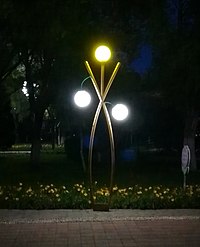Streetlight effect

The streetlight effect is when people focus their search for something in an area where it is easy to look for, even if that area is not the most likely place to find it. It is like looking for a lost toy under a streetlight even if it was lost in a dark alley, just because the streetlight makes it easier to see.
For example, imagine that you lost your favorite toy in a park, but it is getting dark and you cannot see very well. Instead of looking for the toy where you last played with it, you start searching around the nearest streetlight. Even if the toy is not there, it is easier to look for it under the light because you can distinguish the toy's color from the background.
This effect can also occur when scientists try to study a complex problem. They may focus on the parts of the problem that are easy to study or measure, rather than the most critical aspects that will lead to the best solution. It is like being asked to solve a math problem but only focusing on the numbers that are easy to add together, even though those numbers might not be significant to the overall solution.
So, the streetlight effect refers to the tendency to focus on the parts of a problem or search for something that are most accessible rather than the most probable or essential. It is essential to be aware of this effect so that we can approach problems or search for things more comprehensively and not limit ourselves to what is easy to see or analyze.
For example, imagine that you lost your favorite toy in a park, but it is getting dark and you cannot see very well. Instead of looking for the toy where you last played with it, you start searching around the nearest streetlight. Even if the toy is not there, it is easier to look for it under the light because you can distinguish the toy's color from the background.
This effect can also occur when scientists try to study a complex problem. They may focus on the parts of the problem that are easy to study or measure, rather than the most critical aspects that will lead to the best solution. It is like being asked to solve a math problem but only focusing on the numbers that are easy to add together, even though those numbers might not be significant to the overall solution.
So, the streetlight effect refers to the tendency to focus on the parts of a problem or search for something that are most accessible rather than the most probable or essential. It is essential to be aware of this effect so that we can approach problems or search for things more comprehensively and not limit ourselves to what is easy to see or analyze.
Related topics others have asked about:
